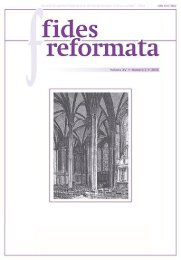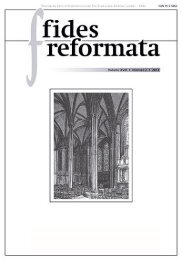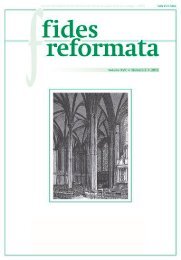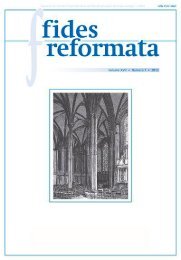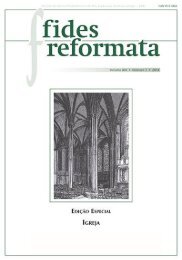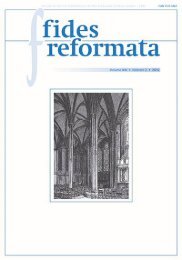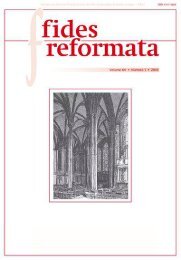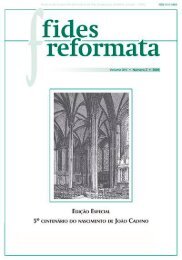You also want an ePaper? Increase the reach of your titles
YUMPU automatically turns print PDFs into web optimized ePapers that Google loves.
FIDES REFORMATA XIX, Nº 2 (2014): 95-115<br />
John and the Others: To Whom Does the<br />
“We” in the Fourth Gospel’s Prologue<br />
and Epilogue Refer?<br />
P.H.R. (Rob) van Houwelingen *<br />
abstract<br />
In both its prologue and the epilogue, the Fourth Gospel uses a corresponding<br />
first person pronoun in the plural form: we. This raises a question<br />
for the reader: what is the identity of the ones who say “we have seen his<br />
glory” (1:14) and “we know that his testimony is true” (21:24)? To answer<br />
this question, other textual indicators from the Fourth Gospel have to be taken<br />
into account, in particular those where the reader is directly addressed by the<br />
author (<strong>19</strong>:35: the unique witness of Jesus’ death at the cross; 20:30-31: not<br />
simply the book’s ending, but rather its statement of purpose, attached to the<br />
confession of Thomas). Additionally, there is the evidence of the so-called<br />
Muratorian Canon, according to which the other disciples encouraged John<br />
to write his Gospel and read along with him what he wrote <strong>do</strong>wn. This article<br />
sets out the following argument: the “we” in question must be interpreted as<br />
including the author himself as the chief witness. In the role of spokesman, he<br />
finds himself in the midst of a circle of eyewitnesses. Furthermore, the “we”<br />
given in the prologue <strong>do</strong>es not suggest an identification with the readers, nor<br />
should it be interpreted as a substitute for “I”, as though it were a plural of<br />
majesty (or the “we” of authoritative testimony, as Richard Bauckham has<br />
argued). Thus, the Fourth Gospel is framed by John’s testimony together with<br />
that of his fellow eyewitnesses.<br />
* Dr. P. H. R. van Houwelingen is professor of New Testament at the Theological University of<br />
Kampen, The Netherlands, as well as research associate in the Department of New Testament Studies,<br />
University of Pretoria, South Africa.<br />
95





